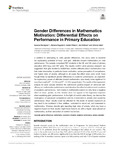Mostrar o rexistro simple do ítem
Gender Differences in Mathematics Motivation: Differential Effects on Performance in Primary Education
| dc.contributor.author | Rodríguez, Susana | |
| dc.contributor.author | Regueiro, Bibiana | |
| dc.contributor.author | Piñeiro, Isabel | |
| dc.contributor.author | Estévez, Iris | |
| dc.contributor.author | Valle, Antonio | |
| dc.date.accessioned | 2020-03-17T11:47:31Z | |
| dc.date.available | 2020-03-17T11:47:31Z | |
| dc.date.issued | 2020 | |
| dc.identifier.citation | Rodríguez S, Regueiro B, Piñeiro I, Estévez I and Valle A (2020) Gender Differences in Mathematics Motivation: Differential Effects on Performance in Primary Education. Front. Psychol. 10:3050. doi: 10.3389/fpsyg.2019.03050 | es_ES |
| dc.identifier.issn | 10.3389/fpsyg.2019.03050 | |
| dc.identifier.uri | http://hdl.handle.net/2183/25181 | |
| dc.description.abstract | [Abstract] In addition to attempting to verify gender differences, this study aims to examine the explanatory potential of boys’ and girls’ attitudes toward mathematics on their performance. The sample comprised 897 students in the 5th and 6th years of primary education (450 boys and 447 girls). The results confirm what previous research has suggested, that girls tended to exhibit less positive attitudes about mathematics than their male classmates, in particular lower motivation, worse perception of competence, and higher rates of anxiety, although in all cases the effect sizes were small. Even though there no significant gender differences in academic performance, as expected, the explanatory power of attitudes toward mathematics was clearly more significant in boys than in girls (R2 = 0.194 and R2 = 0.103, respectively). The results of the regression analysis for each sample reinforce the well-known positive impact of perceived self-efficacy on mathematics performance and introduce the effect of achievement emotions of academic performance. Test anxiety in mathematics seems to only have a negative effect on boys’ grades, as this variable does not appear in the regression equation when explaining girls’ performance. In the light of control-value theory, we discuss the contingency of perceived competence and its involvement in anxiety and academic performance. Boys’ results could be affected by the levels of anxiety inasmuch as they tend to be confident in their abilities, motivated to stand out, and interested in mathematics. Whereas despite girls reporting high rates of anxiety, what may have a negative impact on their results might have more to do with a higher value placed on mathematics, as their perception of control may be low. | es_ES |
| dc.description.sponsorship | This work was carried out with financing from the research projects EDU2013-44062-P (MINECO) and EDU2017-82984-P (MEIC) | es_ES |
| dc.language.iso | eng | es_ES |
| dc.relation | info:eu-repo/grantAgreement/MINECO/Plan Estatal de Investigación Científica y Técnica y de Innovación 2013-2016/EDU2013-44062-P/ES/RELACION ENTRE DEBERES ESCOLARES Y RENDIMIENTO ACADEMICO: UNA PERSPECTIVA MULTINIVEL Y LONGITUDINAL | |
| dc.relation | info:eu-repo/grantAgreement/AEI/Plan Estatal de Investigación Científica y Técnica y de Innovación 2017-2020/EDU2017-82984-P/ES/CALIDAD Y EQUIDAD EN LA PRESCRIPCION DE DEBERES ESCOLARES: DISEÑO E IMPLEMENTACION DE PROPUESTAS BASADAS EN EVIDENCIAS EMPIRICAS | |
| dc.relation.uri | https://doi.org/10.3389/fpsyg.2019.03050 | es_ES |
| dc.rights | Atribución 4.0 Internacional | es_ES |
| dc.rights.uri | http://creativecommons.org/licenses/by/4.0/ | * |
| dc.subject | Gender differences | es_ES |
| dc.subject | Mathematics | es_ES |
| dc.subject | Academic motivation | es_ES |
| dc.subject | Academic performance | es_ES |
| dc.subject | Primary education | es_ES |
| dc.title | Gender Differences in Mathematics Motivation: Differential Effects on Performance in Primary Education | es_ES |
| dc.type | info:eu-repo/semantics/article | es_ES |
| dc.rights.access | info:eu-repo/semantics/openAccess | es_ES |
| UDC.journalTitle | Frontiers in psychology | es_ES |
| UDC.volume | 10 | es_ES |
| UDC.startPage | 1 | es_ES |
| UDC.endPage | 8 | es_ES |
Ficheiros no ítem
Este ítem aparece na(s) seguinte(s) colección(s)
-
GI-GIPED - Artigos [57]






